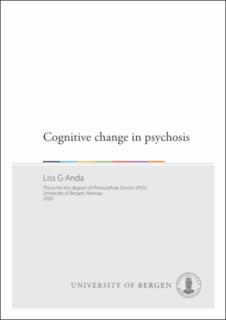| dc.contributor.author | Anda, Liss Gøril | |
| dc.date.accessioned | 2020-10-16T13:40:39Z | |
| dc.date.available | 2020-10-16T13:40:39Z | |
| dc.date.issued | 2020-10-23 | |
| dc.date.submitted | 2020-10-10T02:21:47Z | |
| dc.identifier | container/53/2a/8c/75/532a8c75-8cc0-406c-be19-075a4dbce118 | |
| dc.identifier.isbn | 9788230856383 | |
| dc.identifier.isbn | 9788230864692 | |
| dc.identifier.uri | https://hdl.handle.net/1956/24149 | |
| dc.description.abstract | Background:
Cognitive functioning is impaired in schizophrenia spectrum disorders, with cognitive symptoms a core part of schizophrenia. Cognitive impairment is associated with poorer daily life functioning and prognosis, making it an important treatment goal. As opposed to positive symptoms, cognitive symptoms have proven quite resistant to antipsychotic drug treatment. It is also unclear how cognitive functioning changes throughout the course of psychosis, from the prodromal stage, during acute psychosis and after the onset of medical treatment. The aim of this thesis was to investigate cognitive impairment and change during these three important stages of illness.
Paper I aimed to investigate the relation between cognitive and symptomatic change in patients with psychotic disorders (n=84) during the early acute phase of illness. Psychotic symptoms in the sample were due to schizophrenia spectrum disorders (F20-29), psychoactive substance use (F12-19), and affective disorders with psychosis (F31-33). We administered the RBANS neurocognitive test battery on admission and again at acute ward discharge (mean time 4.1 weeks, SD 1.86 weeks), using PANSS to assess symptomatic change. We found cognitive impairment (t < 35) in 28.6% of participants at baseline and 13.1% at follow-up. PANSS negative symptoms change significantly predicted total RBANS performance improvement (beta = -.307, p = .016). There was no significant difference in cognitive change between subjects with schizophrenia and those with other psychotic disorders. Findings thus indicated that the proportion of subjects with mild to moderate impairment in cognitive test performance is reduced across the acute phase of psychosis, and that improvement is related to amelioration of negative symptoms.
Paper II compared the cognitive functioning and profile of UHR subjects (n=51) to a sample with schizophrenia (F20), split into two groups based on duration of illness (n=19 and 22). Comparisons were made using coordinated norms based on healthy controls (n=61) reflecting the younger UHR age spectrum. A comprehensive neurocognitive test battery aiming to measure speed of processing, working memory, verbal learning, reasoning, and problem solving, as well as visual problem solving were used. UHR subjects showed impaired speed of processing (p<.001), working memory (p=.042) and verbal learning, reasoning and problem solving (p=.007) as compared to the control group. Visual problem solving skills appeared unimpaired. UHR subjects significantly outperformed the schizophrenia group with duration of illness >3 years for speed of processing and working memory (both p<.001). There were no significant differences in performance between the UHR group and the group with duration of schizophrenia < 3 years. It can be concluded that cognitive performance is impaired in UHR subjects and should thus be monitored by clinicians. If spatial skills are less impaired, this could be useful to know when facilitating academic and work participation for this group.
Paper III compared cognitive change in three groups of participants with schizophrenia spectrum disorder (F20-F29) receiving amisulpride (n=33), aripiprazole (n=32), and olanzapine (n=39) over 12 months. A short neurocognitive test battery was administered at baseline and again at 6, 26 and 52 weeks. Sample average cognitive test t-scores improved from 42.20 to 46.39 over the year, rising significantly to 6 (Δ2.0; p= .002), 26 (Δ3.4; p< .001) and 52 (Δ4.2; p< .001) weeks, corresponding to a medium effect size Cohen’s d of .53. There were no significant between-drug changes in the amount of improvement. Nor were there any significant differences in change between subjects with schizophrenia and those with other psychotic disorders. Our findings thus indicate that despite significant improvements in cognitive test performance, there were no significant between-drug differences in cognitive change in the 12 months following onset of a new course of treatment.
Conclusion:
The findings from the present thesis suggest that cognitive impairment in psychosis is present before the appearance of positive symptoms, with a similar but less severe profile of impairment than in established psychotic disorders. Cognitive impairment appears to fluctuate alongside the course of psychosis, with improvement seen during the first weeks of treatment in acute psychosis, and further improvement with the onset of medical treatment. | eng |
| dc.language.iso | eng | eng |
| dc.publisher | The University of Bergen | eng |
| dc.relation.haspart | Paper 1: Anda, L., Brønnick, K. S., Johnsen, E., Kroken, R. A., Jørgensen, H., & Løberg,
E.-M. (2016). The course of neurocognitive changes in acute psychosis: relation to
symptomatic improvement. PloS one, 11(12), e0167390. The article is available in the main thesis. The article is also available at: <a href="https://doi.org/10.1371/journal.pone.0167390" target="blank">https://doi.org/10.1371/journal.pone.0167390</a> | eng |
| dc.relation.haspart | Paper 2: Anda, L., Brønnick, K. S., Johnsen, E., Kroken, R. A., Johannessen, J.O., Joa, I., &
Løberg, E.-M. (2019). Cognitive profile in ultra-high risk for psychosis and
schizophrenia: A comparison using coordinated norms. Frontiers in Psychiatry,
10, 695. The article is available at: <a href="http://hdl.handle.net/1956/23836" target="blank">http://hdl.handle.net/1956/23836</a> | eng |
| dc.relation.haspart | Paper 3: Anda, L., Johnsen, E., Kroken, R. A., Joa, I., Rettenbacher, M., Løberg, E.-M. Cognitive change and antipsychotic medications: Results
from a pragmatic rater-blind RCT. The article is not available in BORA. | eng |
| dc.rights | In copyright | eng |
| dc.rights.uri | http://rightsstatements.org/page/InC/1.0/ | eng |
| dc.title | Cognitive change in psychosis | eng |
| dc.type | Doctoral thesis | eng |
| dc.date.updated | 2020-10-10T02:21:47Z | |
| dc.rights.holder | Copyright the Author. All rights reserved | eng |
| dc.contributor.orcid | https://orcid.org/0000-0003-2431-4306 | |
| fs.unitcode | 17-32-0 | |
